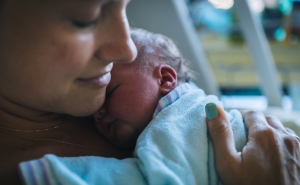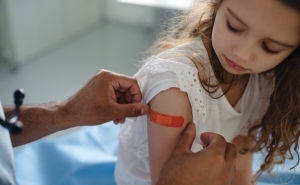For Better Adult Mental and Relational Health, Boost Positive Childhood Experiences
Positive child experiences offset chances of depression and poor mental health in adulthood, even for those who faced numerous childhood adversities
Positive childhood experiences, such as supportive family interactions, caring relationships with friends, and connections in the community, are associated with reductions in chances of adult depression and poor mental health, and increases in the chances of having healthy relationships in adulthood, a new study led by Johns Hopkins Bloomberg School of Public Health researchers suggests. This association was true even among those with a history of adverse childhood experiences.
The findings, published September 9 in JAMA Pediatrics, could encourage public health efforts and policies aimed at boosting positive childhood experiences in conjunction with reducing adverse childhood experiences.
Researchers have long known that adverse childhood experiences, such as physical or emotional abuse or neglect, substance abuse and mental health problems in the household, exposure to violence, parental incarceration or divorce, can have lifelong negative effects on physical and mental health, explains study leader Christina Bethell, PhD, MPH, MBA, professor in the Bloomberg School’s Department of Population, Family and Reproductive Health and director of the Child and Adolescent Health Measurement Initiative.
The association between adverse childhood experiences and health effects is complex. Some individuals with multiple adverse childhood experiences thrive while others do not. And, many without adverse childhood experiences have health issues associated with adverse experiences, perhaps due to a lack of positive childhood experiences.
Positive childhood experiences are a key factor in influencing health and well-being, yet have not been sufficiently studied to date.
Bethell and her colleagues found a significant connection between positive childhood experiences and adult respondents’ mental and emotional health. For those reporting six to seven positive childhood experiences, the odds of having depression or 14 or more poor mental health days in the previous months were 72 percent lower than for those reporting zero to two positive childhood experiences. Even for those reporting three to five positive childhood experiences, the odds of depression or poor mental health were 50 percent lower than those reporting zero to two positive childhood experiences. These associations held true even when respondents reported multiple adverse childhood experiences.
Additionally, the odds that respondents answered “always” on the question about getting the social and emotional support they need as adults was 3.53 times greater for those reporting six to seven positive childhood experiences compared to those reporting zero to two. Even among those with no adverse childhood experiences, only one-third reported always getting the social and emotional support they needed if they had zero to two positive childhood experiences. This was half the rate as those with six to seven such experiences. “Given the science linking social and emotional support to life expectancy, health and suicide, these findings have important implications,” Bethell explains.
For their study, Bethell and her colleagues investigated the effects of positive childhood experiences analyzing data from the Wisconsin Behavioral Risk Factor Survey, a yearly random digit-dial telephone survey conducted in collaboration with the U.S. Centers for Disease Control and Prevention. The survey collects state-level data about health-related risk behaviors, chronic health conditions, and the use of preventive services.
In the 2015 Wisconsin survey, the state included seven extra questions related to positive childhood experiences. These included whether the respondents (1) were able to talk with their families about their feelings, (2) felt that their families stood by them during difficult times, (3) enjoyed participating in community traditions, (4) felt a sense of belonging in high school, (5) felt supported by friends, (6) had at least two non-parent adults who took genuine interest in them, and (7) felt safe and protected by an adult in their home.
The study designed, tested, and used a new positive childhood experiences measure that showed a dose-response relationship between how many positive experiences adults reported and their mental and relational health. This new “cumulative positive” design captures aggregate experiences in the same way adverse childhood experiences measure “cumulative risk.”
The survey also scored respondents’ adverse childhood experiences and included questions about mental health, including diagnoses of depression and how many reported having poor mental health days in the past month. In addition, respondents were asked how often they got the social and emotional support they need (adult-reported social and emotional support). More than 6,000 adults ages 18 and older participated in the survey.
“This study offers the hopeful possibility that children and adults can thrive despite their accumulation of negative childhood experiences,” say Bethell. “People assume eliminating adversity automatically results in good health outcomes, but many people reporting lower adversity in childhood still had poorer mental and relational health outcomes if they did not also report having had positive childhood experiences.”
“Positive Childhood Experiences and Adult Mental and Relational Health in a Statewide Sample: Associations Across Adverse Childhood Experiences Levels” was written by Christina Bethell, PhD, MPH, MBA; Jennifer Jones, MSW; Narangerel Gombojav, MD, PhD; Jeff Linkenbach, ED; and Robert Sege, MD, PhD.
This study was funded by the Robert Wood Johnson Foundation (Grant 75448); a Health Resources and Services Administration grant (UA6MC30375); Casey Family Programs cooperative agreement to Health Resources in Action; the National Center for Advancing Translational Sciences, National Institutes of Health Award (UL1TR002544); the Wisconsin Children’s Trust Fund (now Wisconsin Child Abuse and Neglect Prevention Board).
# # #
Media contacts for the Johns Hopkins Bloomberg School of Public Health: Barbara Benham at 410-614-6029 or bbenham1@jhu.edu and Robin Scullin at 410-955-7619 or rsculli1@jhu.edu.





